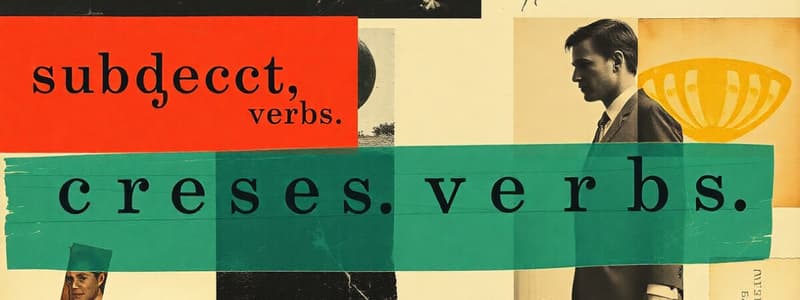Podcast
Questions and Answers
Identify the sentence that exhibits the correct subject-verb agreement.
Identify the sentence that exhibits the correct subject-verb agreement.
- Each of the participants have a unique perspective.
- The CEO, along with her management team, is attending the conference. (correct)
- The team members disagrees on the project's objective.
- The data, which was collected recently, are inconclusive.
Which sentence demonstrates the correct use of commas?
Which sentence demonstrates the correct use of commas?
- My brother who is an engineer, works for a large company. (correct)
- She is planning to visit Rome Paris and London next summer.
- Despite the rain the game continued.
- Having finished the test I left the room.
Select the sentence that uses the correct verb tense to indicate a completed action in the past with a continuing relevance to the present.
Select the sentence that uses the correct verb tense to indicate a completed action in the past with a continuing relevance to the present.
- They have been known each other for a long time.
- She has finished the report yesterday.
- I have been living in this city since five years.
- He has been working on the project for several months. (correct)
Determine the sentence that uses the subjunctive mood correctly to express a wish or a hypothetical situation.
Determine the sentence that uses the subjunctive mood correctly to express a wish or a hypothetical situation.
Choose the sentence that best demonstrates correct parallel structure.
Choose the sentence that best demonstrates correct parallel structure.
Flashcards
Subject
Subject
The part of a sentence that identifies who or what the sentence is about.
Verb
Verb
A word that expresses an action or a state of being.
Basic Sentence Structure
Basic Sentence Structure
The fundamental way to arrange words into a coherent sentence, typically subject + verb + object.
Punctuation
Punctuation
Signup and view all the flashcards
Verb Forms
Verb Forms
Signup and view all the flashcards
Study Notes
Subjects and Verbs
- A subject is the person, place, thing, or idea that performs the action or is described in the sentence.
- It typically answers the question "who" or "what."
- A verb is the action or state of being performed by the subject.
- It typically answers the question "what is happening to whom" or "what does the subject do?
Basic Sentence Structure and Punctuation
-
A basic sentence includes a subject and a verb.
-
A well-formed sentence expresses a complete thought, and must include a subject and a verb.
-
Simple sentences can combine subjects and verbs to describe actions, states of being, and descriptions of the subject.
-
Periods, question marks, and exclamation points indicate the end of a sentence.
-
Commas separate items in a series.
-
Commas often separate introductory phrases from the rest of a sentence.
-
Common errors include:
- Missing verbs in sentences: example: "The dog barked." (subject and verb) vs "The dog" (missing verb)
- Using incorrect subjects:
- "The dog barked excitedly." (correct - The dog is the subject, barked is the verb)
- "Excitedly barked the dog." (incorrect)
-
Use of correct punctuation ensures clarity and emphasizes ideas.
Verb Forms
- Verbs change form according to their tense. Tense describes when the action takes place.
- Verbs have different forms depending on the subject's role in the sentence (e.g., present tense, past tense, future tense, present participle, past participle, etc.)
- Regular verbs follow predictable patterns of change when changing verb tense.
- Irregular verbs do not follow predictable patterns of change when changing verb tense.
- Knowing and understanding the correct use of tenses in grammatically correct sentences is critical to clear communication.
- Different verb forms, like “run,” “running,” and “ran,” clearly indicate time frames. "Run" is the base form and likely indicates present tense, "running" is present participle indicating ongoing action, and "ran" is the past tense.
- Using correct verb forms is essential for expressing actions precisely and in the intended time frame.
Studying That Suits You
Use AI to generate personalized quizzes and flashcards to suit your learning preferences.




